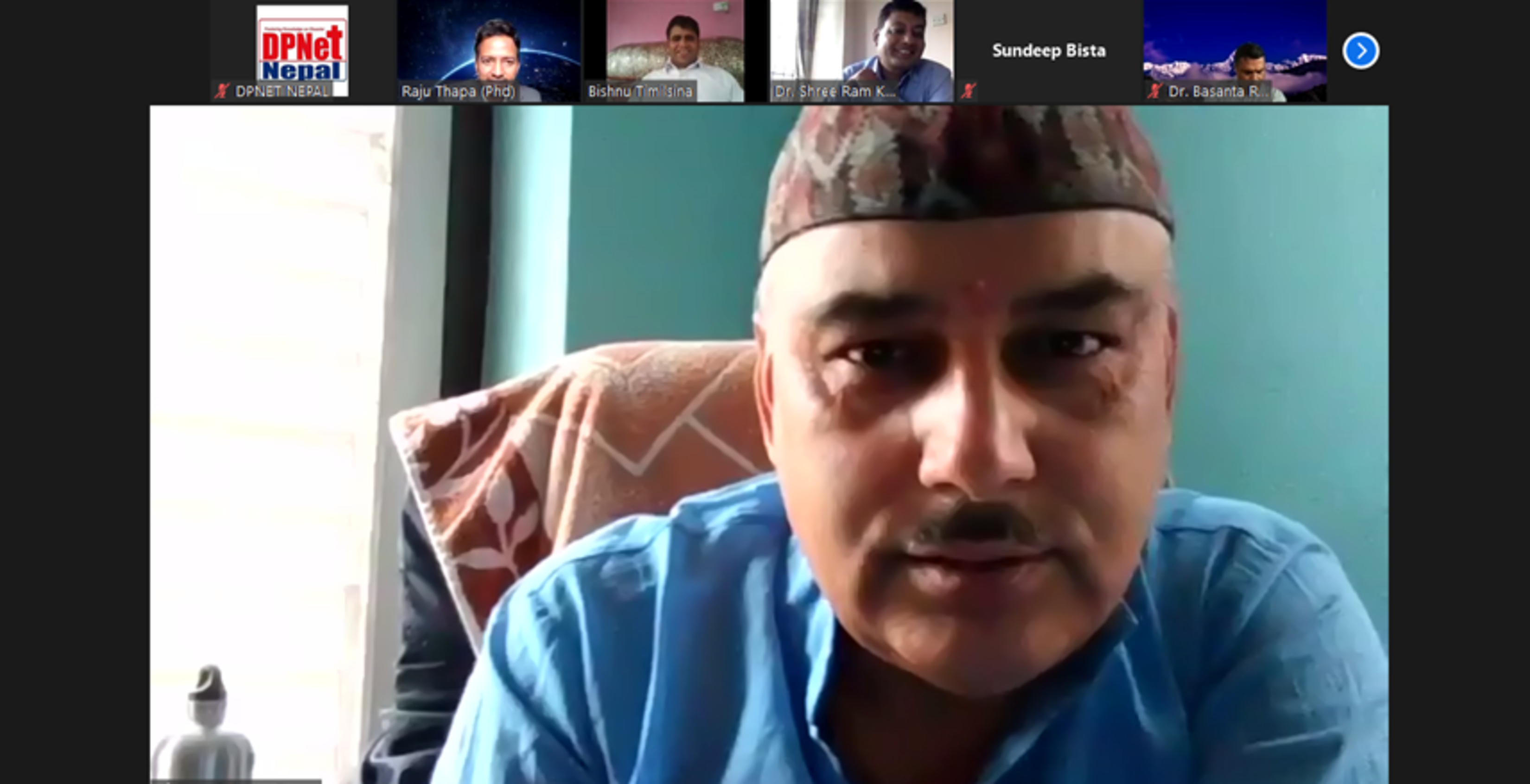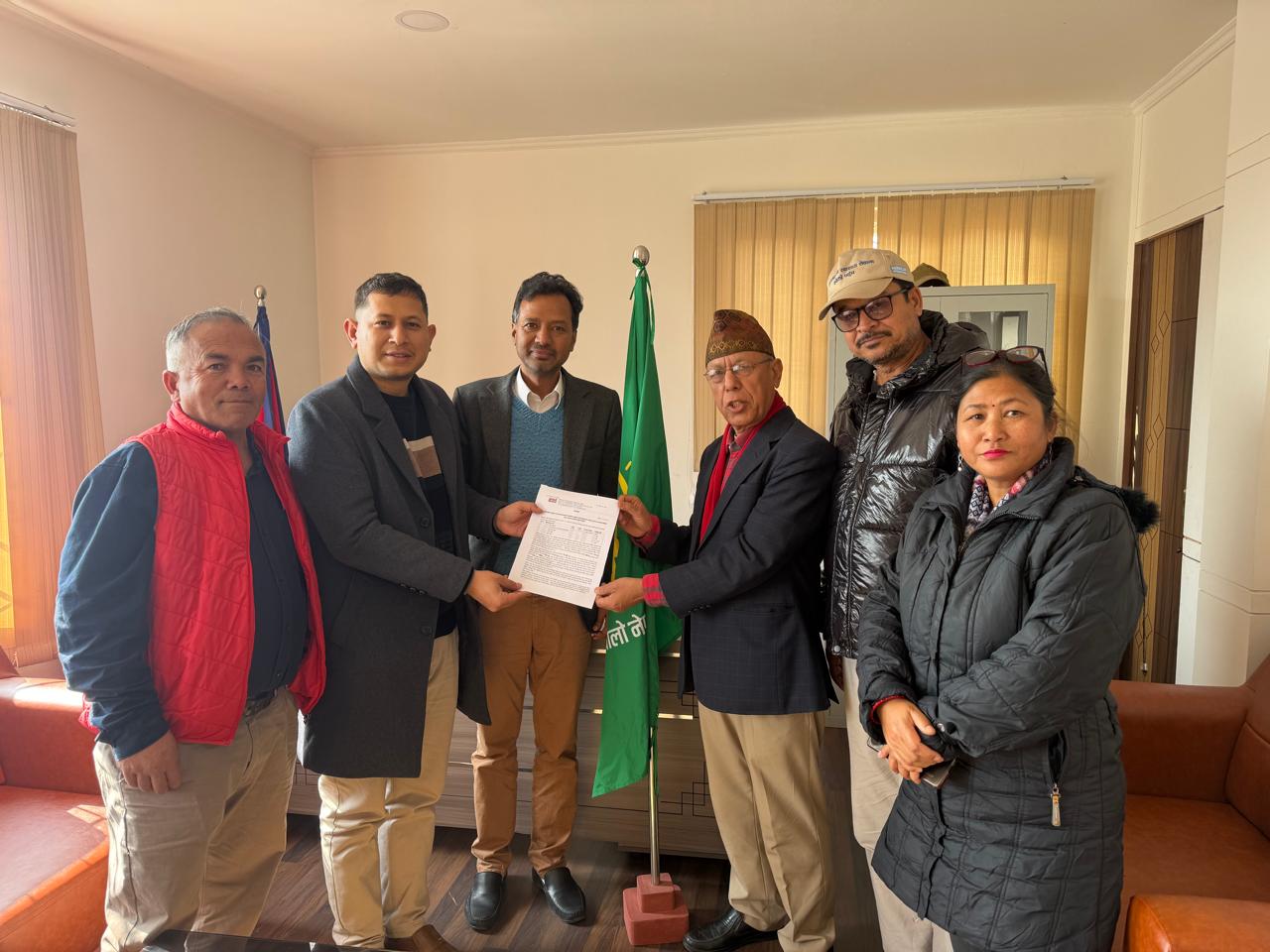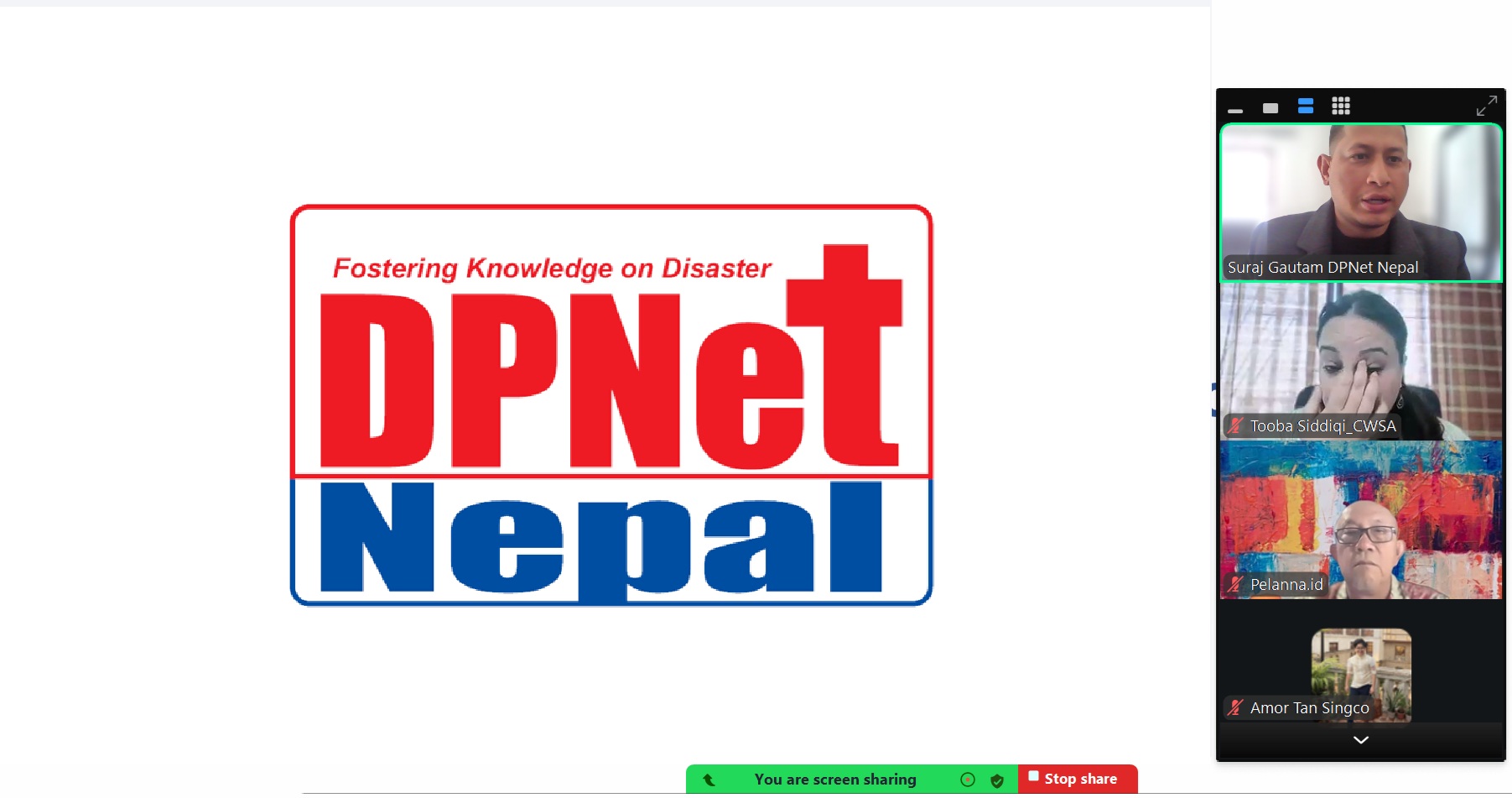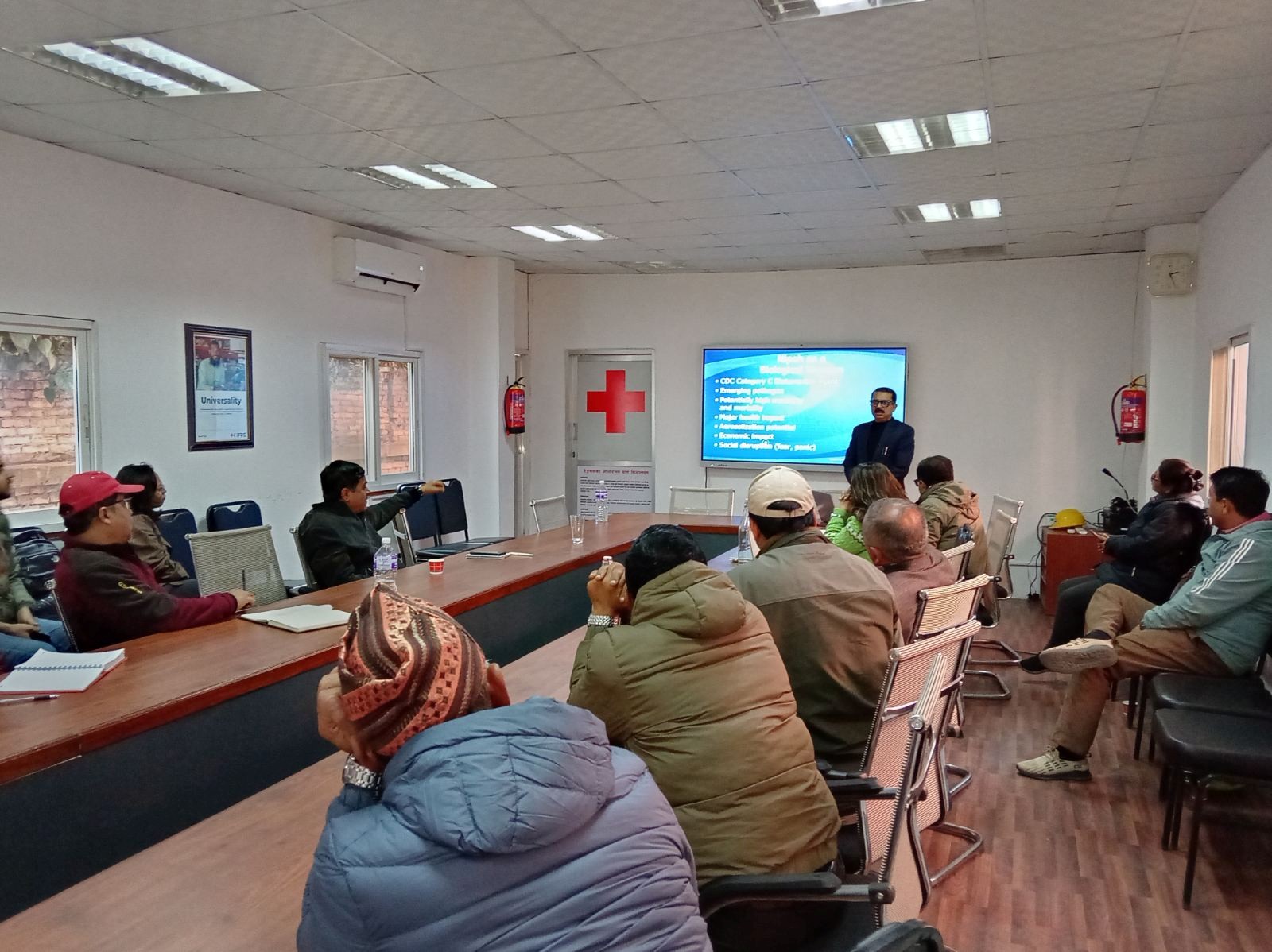National Platform for Disaster Risk Reduction (NPDRR), Subjective Committee (Academia/Research Based Organization) Discussion Program

The Subjective Committee discussion program of Academia/Research Based Organization under the National Platform for Disaster Risk Reduction (NPDRR) was organized by DPNet-Nepal under USAID/Tayar Nepal Capacity Enhancement for DRR&M project on 21st July, 2021. The program was chaired by Mr. Anil Pokhrel, Executive Chief of National Disaster Risk Reduction and Management Authority (NDRRMA). Mr. Surya Bahadur Thapa, Chairperson of DPNet-Nepal delivered the opening remarks and highlighted the objective of the program. He briefly shared about the NPDRR and the importance of Academia and Research Based Organizations in disaster risk reduction and management. He further stated that research carried out in DRR&M can contribute and provide information on how we can reduce the disaster risk and reduce the loss and damage. Altogether 38 participants joined the webinar.
Major Highlights
- Dr. Raju Thapa, General Secretary of DPNet gave a presentation on the National Platform for Disaster Risk Reduction and its Implementation. He explained about the importance of formation of stakeholder’s group (Government Agencies, Semi-Government Agencies, Donor/UN Agencies, INGO, NGO, Private Sectors, Information Technology and Media and Disaster Affected Community) under NPDRR as provisioned in the Guideline. He cleared the implementation of NPDRR Guideline as the Province and Local level can form the Province and Local Platform for DRR with reference to the NPDRR Guideline and the DRR&M related Act of the concerned Province/Local level. He added that the Local Platform needs to inform the Provincial Platform and the Provincial Platform needs to inform the National Platform about the formation of the platform and decision. The different level platforms can work in a coordinated way. He emphasizes on the need of Academicians and Researcher in DRR&M in Nepal.
- Mr. Bishnu Prasad Timilsina, Consultant shared the draft frame of the Subjective Committee Guideline for Academia and Research Based Organization within the provisions of NPDRR Guideline. He shared the objectives, provision regarding the members in the committee, power, roles and responsibility of the Subjective Committee. He also said that the draft will be shared with Academia and Research Based Organization group for their feedback and finalization.
- The Subjective Committee of Academia and Research Based Organization was formed and the team members were nominated by the participants. Dr. Basanta Raj Adhikari from Institute of Engineering, Pulchowk was nominated as a Coordinator and Mr. Amrit Sharma from Patan Multiple Campus was nominated as a member. The formed committee will discuss and hold the further meeting with a wider network to include all concerned stakeholders in the Subjective Committee.
Major Discussions
- It was discussed about gender mainstreaming in disaster response. This is because women's and men's different roles, responsibilities, and access to resources influence how each will be affected by different hazards, and how they will cope with and recover from disaster.
- We need to make the Subjective Committee inclusive, by bringing women professionals to this forum and also to remove the generation gap.
- Identifying the risks and vulnerabilities of the local communities is the first important step in the management of disasters. It lays the foundation for further disaster preparedness and mitigation activities.
- It is discussed that our duty is to support people to understand the risks, and their important role in protecting themselves and being more resilient. So the engagement of Academia and Research Based Organization in DRR&Mprovides awareness of what to do during and after disasters. This would lessen panicking, paranoid and uncontrollable people running around.
- Disaster education aims to provide knowledge among individuals and groups to take actions to reduce their vulnerability to disasters. The formation of the Subjective Committee will help to coordinate and understand the issue that trained people can be prepared for disasters and responding well has been extensively investigated.
- There is a need to harness the knowledge of the Scholar and Academician returned form foreign country before there is brain drain.
- Disaster studies address the social and behavioral aspects of sudden onset collective stress situations typically referred to as mass emergencies or disasters and address the impacts of these events on all social units ranging from individuals and households to nation-states
- The research and experiences on DRR&M would lessen panicking, paranoid and uncontrollable people running around knowing what to do when disaster strikes will also lessen the death toll. The DRRM approach helps them conduct effective disaster response while reducing risks that similar disasters will reoccur.
- DRR education can help empower people to become thoughtful and active leaders, prepared and able, to advocate for their community's disaster mitigation needs, and to manage and strengthen their community to become resilient to the threats, and consequences.
- We need to consider the whole of society approach and we need to have a wider scope, so individuals should also be encouraged to participate in this group. Individuals may have more knowledge, but they may not always represent the organization.There is a complex scenario in decision making in university administration, so there is a need to consider both aspects.
Remarks
Ms. Luna Khadka, Program Coordinator of DPNet-Nepal thanked all Academicians and Researcher for participating in the program. Similarly, she thanked USAID/Tayar Nepal for the collaboration to organize this program and staff of DPNet-Nepal and Consultant for their time and effort in conducting the program successfully. Concluding the vote of thanks, she said the developed countries are more focused on evidence based research for DRR&M, however such practice is lacking or overlooked in our country, so there is a need to emphasize on evidence based research. She requested everyone to work together in building the disaster resilient nation.
Mr. Anil Pokhrel, Chief Executive of NDRRMA highlighted about the importance of the Subjective Committee of Academia and Research Based organization. He added that we need to utilize experience, knowledge, ideas and skills to build resilience in DRR&M.
He stated that we need to increase the capacity to reconstruct and recover the damages and losses that we have faced. In his closing remarks, he said identifying the vulnerable areas, taking collective actions and putting efforts in remuneration can be best practice in DRR&M. There are many risks and vulnerable areas that need to be addressed. NDRRMA is working on Early warning systems which are now more in practice, mobilizations of volunteers to address these issues, practicing to provide proper compensation to the victims and so on. Mr. Pokhrel thanked, presenters, guests, support agencies and participants for their time and effort in making the event successful and closed the program.











